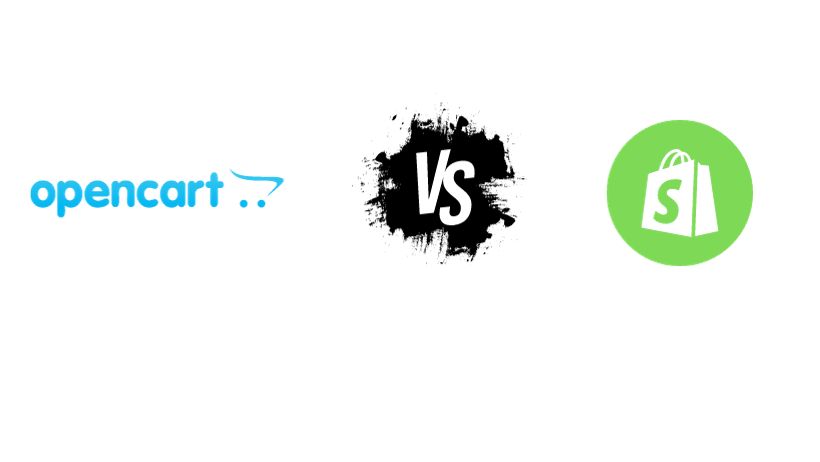In the world of e-commerce, OpenCart vs Shopify emerge as prominent shopping cart solutions, each tailored to address specific needs and goals. The choice between the two depends on factors such as ease of use, financial considerations, search engine optimization (SEO), mobile responsiveness, community support, and available assistance.
It's crucial to grasp the fundamental difference between hosted and open-source shopping carts. Hosted solutions like Shopify offer greater user-friendliness and a more streamlined setup process. On the other hand, open-source options like OpenCart require a certain level of technical expertise but provide more advanced features and customization flexibility. The ultimate decision hinges on your unique preferences and business requirements.
For those unacquainted with these platforms, let's delve into the dynamics of the two leading e-commerce solutions – OpenCart and Shopify – representing the open-source and hosted categories, respectively.
Table Of Content
- OpenCart VS Shopify.
- OpenCart vs Shopify: Why Choose OpenCart?
- Shopify vs OpenCart. Main Pros & Cons.
What is OpenCart VS Shopify?
 Opencart and Shopify this two different CMS (Content management system ). OpenCart and Shopify are both powerful platforms for building an eCommerce store, each with its own distinct strengths and considerations. OpenCart is an open-source solution, offering greater control and flexibility, but requiring technical expertise for setup and maintenance. Shopify, on the other hand, is a hosted platform, providing a user-friendly interface and comprehensive built-in functionality, but with less customization options and ongoing monthly fees.
Opencart and Shopify this two different CMS (Content management system ). OpenCart and Shopify are both powerful platforms for building an eCommerce store, each with its own distinct strengths and considerations. OpenCart is an open-source solution, offering greater control and flexibility, but requiring technical expertise for setup and maintenance. Shopify, on the other hand, is a hosted platform, providing a user-friendly interface and comprehensive built-in functionality, but with less customization options and ongoing monthly fees.
The choice between OpenCart and Shopify ultimately depends on your specific needs and preferences. If you prioritize technical control and customization, OpenCart might be a suitable choice. However, if you value ease of use, ongoing support, and a managed solution, Shopify could be a better fit.
Here's a table summarizing the key differences between OpenCart and Shopify:
| Feature | OpenCart | Shopify |
|---|---|---|
| Type | Open-source | Hosted |
| Cost | Free | Paid |
| Setup | Self-managed | Managed |
| Technical Expertise | Required | Not required |
| Customization | High | Moderate |
| Control | High | Moderate |
| Support | Community | Company |
By carefully evaluating these factors and considering your long-term goals, you can make an informed decision between OpenCart and Shopify for your eCommerce venture.
Sure, here is a blog about OpenCart vs Shopify. Why Choose OpenCart?
OpenCart vs Shopify: Why Choose OpenCart?

OpenCart and Shopify are two of the most popular eCommerce platforms on the market. They both offer a wide ranges of features and benefits, making them ideal for businesse of all sizes. However, there are some key differences between the two platforms that you make consider before making a decision.
OpenCart is an open-source platform that is completely free to use. This means that you have complete control over your store, including the design, functionality, and hosting. However, it also means that you are responsible for maintaining your store and keeping it up to date.
Shopify is a hosted platform that charges a monthly fee. This fee covers the cost of hosting, security, and support. Shopify is also very easy to use, even if you don't have any coding experience.
So, why should you choose OpenCart?
Here are some of the reasons why OpenCart is a great choice for businesses of all sizes:
- It is free to use.
- It is open-source, which means that you have complete control over your store.
- It is very customizable.
- It has a large community of users and developers.
Here are some of the specific benefits of using OpenCart:
- OpenCart is very scalable. This means that it can grow with your business.
- OpenCart is very secure. OpenCart is a mature platform with a strong security track record.
- OpenCart is very flexible. OpenCart can be used to sell a wide variety of products and services.
- OpenCart is very SEO-friendly. OpenCart makes it easy to optimize your store for search engines.
Who should choose OpenCart?
OpenCart is a best choice for businesses that:
- Are looking for a free eCommerce platform.
- Want complete control over their store.
- Have the technical skills to maintain their store.
- Are looking for a scalable and secure platform.
- Want a platform that is SEO-friendly.
How to get started with OpenCart
Getting started with OpenCart is easy. You can download the software for free from the OpenCart website. Once you have downloaded the software, you can install it on your own website hosting account.
Here are some resources to help you get started with OpenCart:
- The OpenCart documentation
- The OpenCart forum
- The OpenCart community
Shopify vs OpenCart. Main Pros & Cons
 Shopify Pros
Shopify seamlessly manages the technical aspects of run a online store, allowing you to focus on your business growth and marketing strategies. It provides a comprehensive suite of marketing and SEO tools to boost your sales and reach a wider audience.
Key Marketing Tools:
Shopify Pros
Shopify seamlessly manages the technical aspects of run a online store, allowing you to focus on your business growth and marketing strategies. It provides a comprehensive suite of marketing and SEO tools to boost your sales and reach a wider audience.
Key Marketing Tools:
- Customizable coupon codes and discount system
- Integrated email marketing platform
- Free advertising credits
- Seamless social media integration
- Intuitive interface and easy-to-use setup process
- Built-in content management system (CMS) for effective content marketing
- Extensive app store offering a wide range of functionalities
- Abandoned cart recovery feature to recapture lost sales
- Default mobile-optimized store design
- Multi-channel selling capabilities
- SEO-friendly URLs and meta descriptions
- Automatically generated sitemap
- Optimized for search engine visibility
- Multiple shipping and payment gateway options
- Secure hosting and infrastructure
- Painless checkout process
- Dedicated support team for assistance
- Built-in business reports for data-driven decision-making
- Support for multiple currencies, languages, and taxes
- Expensive themes and apps, which can add to the overall cost of setting up and running an online store.
- The complexity of some add-ons, which may require technical expertise to implement and optimize.
- Limited access to CSS and HTML customization, which can restrict the degree of design control for store owners.
- Freemium model: OpenCart is completely free to use, with no hidden fees or charges. This makes it an attractive option for businesses on a budget.
- Wide variety of eCommerce templates and designs: OpenCart has a vast library of free and premium templates and designs to choose from. This makes it easy to create a professional-looking online store that reflects your brand's identity.
- Multiple store functionality support: OpenCart allows you to manage multiple stores from a single interface. This is ideal for businesses that sell different products or target different markets.
- SEO-friendliness with meta tags access: OpenCart is SEO-friendly, with built-in tools to help you optimize your store for search engines. This can help you attract more organic traffics to your website.
- Greatest customization freedom: OpenCart is highly customizable, allowing you to modify the look and feel of your store to match your exact needs. You can also add new features and functionalitys using extensions and modules.
- Possibility to edit and customize the store: OpenCart gives you complete control over the code and design of your store. This means you can make any changes you want to create a truly unique and personalized shopping experience for your customers.
- Steeper learning curve: OpenCart's initial setup and configuration can be more challenging compared to other platforms, requiring more time and effort to fully grasp its functionalities.
- Limited customer support: While OpenCart has a vibrant community of users and developers, dedicated customer support for resolving bugs and technical issues may be limited.
- Reliance on costly add-ons: Achieving the full potential of OpenCart often necessitates purchasing additional add-ons and modules, which can significantly increase the overall cost of ownership.
